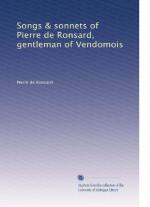|
This section contains 4,661 words (approx. 16 pages at 300 words per page) |

|
SOURCE: "Mythology and Structure in Ronsard's Les Amours (1552-53)," in Myth and Legend in French Literature: Essays in Honour of A. J. Steele, Keith Aspley, David Bellos, Peter Sharratt, eds., The Modern Humanities Research Association, 1982, pp. 60-72.
When we read the early love-sequences of the Pléiade, notably Du Bellay's Olive (1549-50), Pontus de Tyard's Erreurs amoureuses (1549) and Ronsard's Amours (1552), we shall see that only Ronsard has made extensive use of classical legend to enrich his thematic web. Neither Du Bellay nor Pontus really exploits this poetic source; perhaps, given their Christian-Platonizing tendencies, they were less likely to do so—though Pontus draws on it to the extent that it suits his philosophical tastes. At the same time, the uses to which Ronsard puts this material differ in certain respects from the practice of his maturity: for instance, no major figure emerges to embody a cluster of values...
|
This section contains 4,661 words (approx. 16 pages at 300 words per page) |

|


